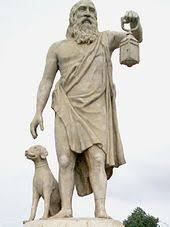We intend Outspokenness as the ancient Greek ‘parresia’.
It is outstanding the relevance which OUTSPOKENNESS holds in the philosophical practices of Athens BC (and then of the Roman empire).
In those societies and cultures, the term <parresia> indicates a precise operation which requires TRUTHFULNESS, RIGHTEOUSNESS and DETERMINATION. Nonetheless, <parresia> involves, more than anything, COURAGE. In fact, such OUTSPOKENNESS is not only the deliberate choice of “saying the truth” (or of saying “what the subject firmly believes is true”). It is the conscious decision of saying the truth “assuming on oneself all the consequences”. Let us consider, for instance, exerting <parresia> in front of a powerful person, criticizing his views or decisions. No doubt, such a behaviour does expose the <parresiaste> to serious dangers.

We intend Outspokenness as the ancient Greek ‘parresia’. Sokrates (Socrates) himself is an irredeemable <parresiaste>. He never refrains from speaking out his mind. Hence, he ends up his life condemned to death by Athen’s authorities because of his continuos OUTSPOKENNESS targeting many a custom of his city’s powerful rulers.
Jesus is a remarkable example of DETERMINATION in not fleeing away from the dangers of <parresia>, again in a time when the authorities (political and religious ones) never accept their own positions to be discussed, let alone to be scrutinized and lambasted.
In our philosophy of the <CARE OF SELF> it is important to extend the notion of <parresia> to the “inner dialogue” of the individual. OUTSPOKENNESS has to be performed not only when speaking to others but – first and foremost – when speaking to ourselves.
In fact, saying the truth to oneself is the indispensable first step along the impervious philosophical TRAINING, that is to try and mould the existence according to principles of honesty, sincerity, austerity and modesty.
